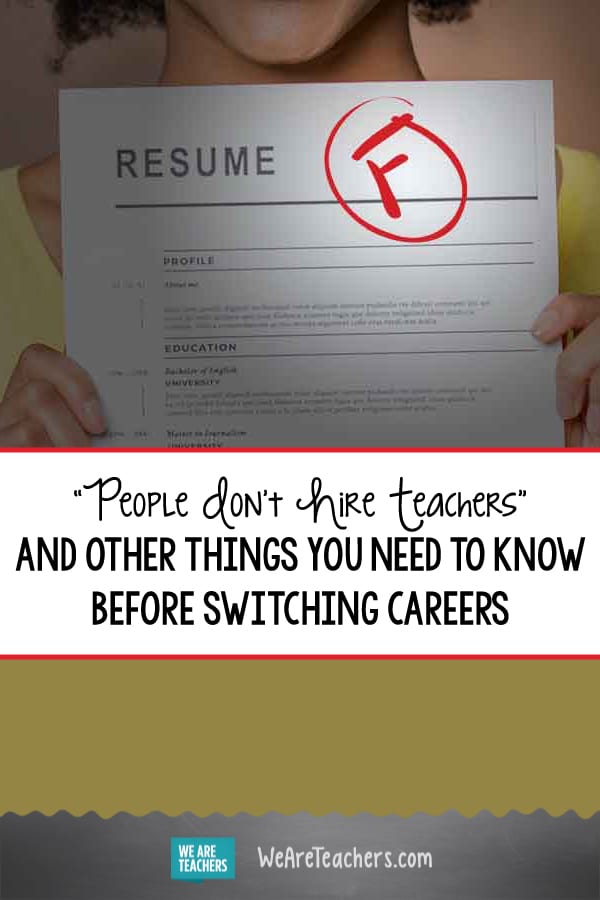Many teachers are seeking career paths outside the classroom in an effort to save their quality of life. About one year ago, I made the decision to leave the classroom without leaving education. Now I split my time between a higher education membership association and freelance writing.
It wasn’t easy. It still isn’t. I miss my students, but I don’t miss the rigidity of my schedule, nor do I miss being unable to pee between the hours of 7 a.m. and 4 p.m.
Yet, even though I left these inhumanities behind, at my core I’m still a teacher.
Chances are, you won’t be able to put your teacher tendencies behind you, either.
“Why is this a problem?” you ask. I asked, too. I was sure that with my multitasking and leadership skills, any employer would be thrilled to hire me.
Then about nine months ago, over summer vacation, I confided in another woman that I’d met that I planned on making a career pivot. I’d thought it over, felt confident in my decision.
Then she told me in a foreboding tone, “Be careful. Nobody likes to hire teachers.”
And I thought to myself, “why?!”
[contextly_auto_sidebar]
“Well,” she told me, “teachers don’t make team players. They are too used to being in charge.”
Naturally, because I am used to being in charge, I disagreed with her.
One year later, after pulling off said career pivot, I got to reflecting one day and realized that I understand now what she meant.
Changing your career might not be as easy as you think.
I’m certainly not trying to discourage you, because I believe in teachers’ abilities to bring focus, leadership, and day-to-day project management skills into the organizations that are smart enough to hire them. However, I don’t believe that enough of these organizations really know how to support teachers in doing the most with their superpowers.
The entrepreneur Seth Godin is known for outlining two types of people who work within a system: the linchpin or the cog. Most workers, says Godin, are cogs—people whose skills are readily available, who work without complaint, never question the status quo, and add value through efficiency, compliance, regularity, and dependability.
As teachers, we know how to be cogs. But we were born to be linchpins.
A linchpin, says Godin, is a person who is indispensable to a system. In the context of the classroom, the teacher is uniquely indispensable because it is she who runs the show. It is she who is constantly thinking on her feet, innovating when the supply closet is scarce, doing more with less, evaluating as she goes along, and trusting her instincts within an environment that is dynamic. She is constantly adjusting and modifying her approach to achieve results that are endlessly fluctuating and child-specific.
Now, I may be oversimplifying this. It’s possible that you’re ready to step down from the spotlight and find a job with less emotionally at stake. Maybe you don’t want to be a linchpin. Besides, Godin has his critics.
Teachers, we know how hard it is to maintain a well-functioning ecosystem. We do it in the classroom every day. So, as you’re considering the leap from your current role into a new professional environment, here are some things to consider for your next career move:
Ask yourself if you want to be an employee at all.
In today’s gig economy, there are many lucrative opportunities available for people who want to be their own boss. You have the regimen, you have the discipline, you have the time management. And be honest—you might not want to give up being the only adult in charge. Maybe this is the year you become a freelance curriculum writer. Or perhaps you transition into sales and put your charisma, sharp mathematical acumen, and well-seasoned orthopedic shoes to work at educational conventions. Trust me, you can do it—but first ask yourself what you want and what you need.
Consider your environment.
It might sound petty, but having access to all that bulk bulletin board paper would seem pretty nice if you were to find yourself working in a cold, gray cubicle. As a teacher, if the Feng Shui wasn’t working in your classroom, you could change it, just like that. In the corporate world, if you want to change your desk or office set up, it requires you put in a request to the office manager or HR and wait for it to be filed. Or worse, just suck it up and bear it. If you are someone who relies on the beauty of your surroundings, remember that when you tell yourself you’d be okay with a box in Corporate Park, USA.
Get used to less feedback.
Sure, most companies have some form of evaluations. But teachers are constantly checking their progress according to some kind of standard. In an office environment, don’t be surprised if you find yourself getting a little, well, impatient, with that single annual review. Or feeling lost without a rubric to hold on to. Don’t worry, the feeling will pass. Or maybe you’ll just make the rubric yourself…
Be kind to leadership and find your place to shine.
It is going to take you some time to let go of the belief that you could do your boss’s job better. And who knows? You might be right. Maybe you’ll get the chance to prove it one day, but for now, relax a little. Enjoy the feeling of weight off of your shoulders and get used to your new pace of life. Look for opportunities to use those teaching skills through heading a committee, organizing office events, or suggesting new project management systems. But take your time, and don’t be discouraged if things don’t move as fast as you are used to in the classroom. Remember, this is a new normal. The stress eczema will soon go away. And if it doesn’t, see number one on this list.
Are you thinking of switching careers? Come and share your experiences in our WeAreTeachers HELPLINE group on Facebook. We look forward to hearing your thoughts!
Plus, 13 jobs to get you out of the classroom—but not out of education.


